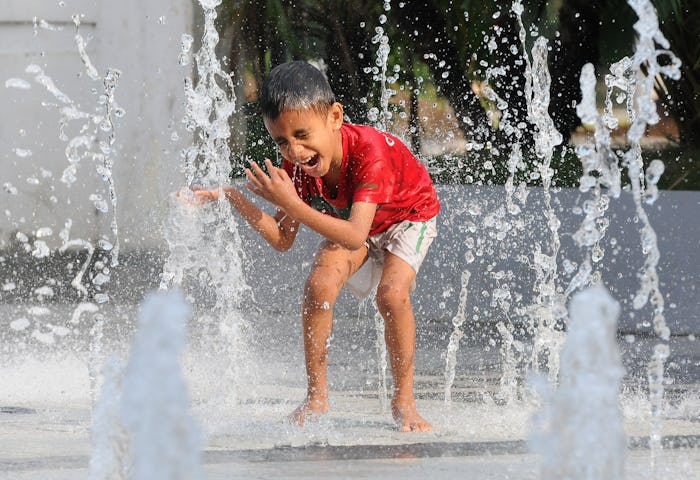Life

Here's Why Your Kid Is Totally Obsessed With Playing & Splashing In Water
Water, water everywhere... and plenty to play in! Most kids that I know absolutely love making a good splash. Whether that means playing in a bathtub, running through a sprinkler, or diving into the ocean, water is water to a playful child, and most kids love playing in it in one form or another. But why do kids love playing in water so much? Just what is it about playing in water that makes it so appealing?
"Children usually enjoy playing in water because it stimulates their senses, and is oftentimes calming. We cannot forget that we form in our mother's womb surrounded by water, and for most of us this was a safe place to grow and develop," Maureen Healy, author of The Emotionally Healthy Child and founder of Growing Happy Kids for parents and teachers, tells romper.
Healy explains that water play helps children engage with their senses, something children often do naturally through all different types of play. "Boys and girls who play with water are stimulating many of their senses (touch, sound, sight)," she says. "Most children love to use their five senses to learn and develop, which includes the senses of touch, sight, and sounds, which most water play has."
Erynn Weston, a Doctor of Physical Therapy currently working with Eternal Anchor, a program for children and adults with special needs in Baja California, explains why water creates such a sensory experience for children. "There are eight sensory categories and water play involves three — auditory, visual, and tactile. Kids experience auditory from hearing the splashes, visual from seeing different lines, shapes, and movement of the water, and tactile from feeling the water on the skin," she tells Romper.
Because water connects to children's senses in these ways, Healy explains how it can be used as a coping tool for kids, furthering their attraction to it. "Water play can be one tool among many to help children soothe and, ultimately, learn to self-regulate. The goal of many sensory activities is to bring the extreme reactions of children toward the middle — or help them find emotional balance via sensory activities. In my book, The Emotionally Healthy Child, I talk about how to create emotional balance, but children who are highly sensitive oftentimes benefit from sensory activities to relieve stress and develop healthy coping skills," she says
Weston also explains how water play can be of sensory benefit to children who may be struggling in some areas of development, especially the ones who already enjoy playing with water. "Water play can be a tool to work on whatever goals you're working towards. If you want to enhance social emotional development, then do water play with other kids. If you want to work on fine motor, bring out small cups and spoons for transferring water. If you want to work on gross motor, put large bowls or pools of water far apart so the child has to lift, maneuver, and pour the bowls," she says.
All of that splashing, pouring, and puddle jumping really does have a purpose. Kids are not only engaging with their senses, but they are reaping the benefits of learning through play and gaining the ability to self-regulate. One way to increase these benefits, Healy tells me, is to get involved yourself. "Parents that play alongside their children help children feel valued and increase their connection with them. So my suggestion is to engage in play therapy or activities along with your child to experience it together," she says.
Both Healy and Weston make a point to acknowledge that not all children love water right off the bat, or they may have reason to be averse to playing in it. "Some children who have had traumatic experiences with water like almost drowning or being near a tidal wave may react differently," Healy says.
One way to help overcome these aversions is through encouragement of water play at a sensory-friendly level. "Sensory play is important in general to avoid sensory-avoidance behaviors. Regarding water, sensory avoidance behaviors would affect bath time and learning to swim. If your child is aversive to water play, an important thing is to make sure they are in control (they are pouring the water, they are putting their hands and feet in the water, etc.) because if you force them to play, you will just increase their aversion," says Weston.
Whether your child naturally loves the water, or learns to love water play over time, these experts agree that the sensory experience of playing with water can be an engaging way for children to learn and have fun while they do it. This developmental connection can foster a love of water and water play that helps kids grow.